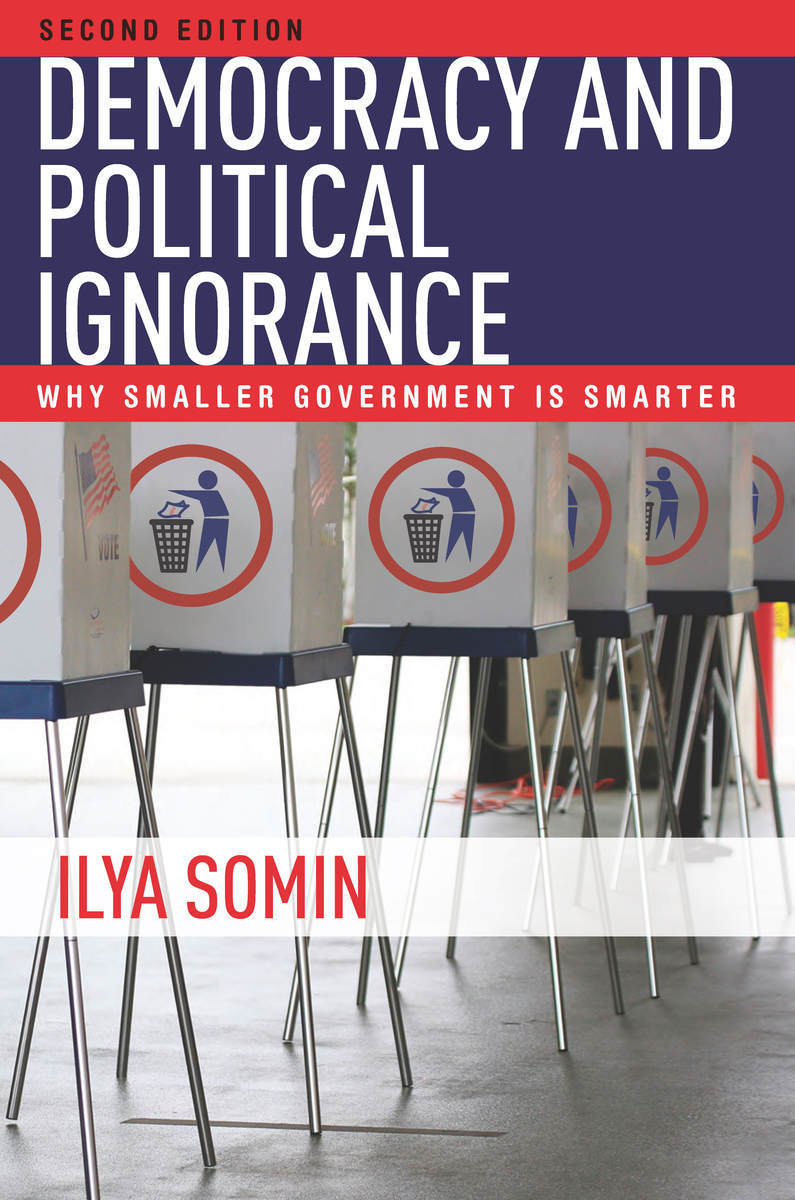This is part of the DR Book Collection.
 The outcome of the election still has many rocking. I had taken up reading GMU law professor Ilya Somin’s Democracy and Political Ignorance: Why Smaller Government Is Smarter the week prior to the election, but finished a few days afterwards. What a timely read. Somin puts forth a wealth of evidence that political ignorance is pervasive among American voters. For example:
The outcome of the election still has many rocking. I had taken up reading GMU law professor Ilya Somin’s Democracy and Political Ignorance: Why Smaller Government Is Smarter the week prior to the election, but finished a few days afterwards. What a timely read. Somin puts forth a wealth of evidence that political ignorance is pervasive among American voters. For example:
- Prior to the 2014 elections, only 38% of Americans knew that Republicans controlled the House of Representatives, while the same amount knew that Democrats had the majority in the Senate (pg. 17).
- In late August 2013, 44% of Americans did not know that the Affordable Care Act was still the law (pg. 18).
- In September 2014, only 20% of Americans knew that the federal government spends more on Social Security than on foreign aid, transportation, and interest on the government debt (pg. 18).
- In August 2012, 43% of Americans had never heard of Paul Ryan and only 32% knew he was a member of the House of Representatives (pg. 18).
- A 2014 poll found that only 36% of Americans could name the three branches of the federal government (pg. 20).
- A 2002 study indicated that 35% of Americans thought Marx’s “From each according to his ability to each according to his need” was in the Constitution with another 34% saying they weren’t sure (pg. 20).
Somin, however, does not believe the above results are due to voter stupidity. Instead, he believes that voters are rationally ignorant: the instrumental value of a single vote is vanishingly small, making the incentive to be well-informed about political matters incredibly weak. But even those who are politically informed act more like sports fans than objective truth-seekers. They cheer for their team and evaluate evidence in a highly-biased fashion. Many think this political ignorance and bias could be overcome with greater education, but Somin points out that even as educational attainment and IQ scores have risen over the last five or six decades, political knowledge levels have barely budged.
How does Somin propose tackling this issue? He advocates increasing the opportunity for people to “vote with their feet.” In the private sector, people spend more time acquiring information about the products and services they intend to consume. Those products or services they dislike, they do not purchase. Similarly, people spend more time acquiring information about the states and cities before relocating. This includes cost of living, laws, etc. Voters leave states and local governments when they find better opportunities elsewhere. To allow for more “foot voting” vs. ballot box voting, Somin recommends more decentralization of government. He explains,
Unlike ballot box voting, “foot voting” creates much better incentives to both acquire information and use it rationally. The reason is simple: for most foot voters, the choice to leave or stay is individually decisive. The would-be migrant does not have to take a vote in which her ballot has only a miniscule chance of making a difference. Rather, she knows that whatever decision she makes she can then implement, subject perhaps to the agreement of a few family members. This simple point has important implications for institutional design in democratic political systems. It strengthens the case for decentralizing political power. The greater the degree of decentralization, the more political decisions can be made by foot voting, rather than ballot box voting alone. The informational advantages of foot voting also buttress the case for limiting the scope of government authority relative to the private sector. In markets and civil society, individuals can often vote with their feet even more effectively than in a system of decentralized federalism. Foot voting in the private sector usually doesn’t carry moving costs as high as those of interjurisdictional migration. In addition, limiting the scope of government could alleviate information problems by reducing the knowledge burden imposed on voters. The smaller and less complex government is, the more likely that even rationally ignorant voters might be able to understand its functions. Smaller government does not make us smarter in the sense of increasing our intelligence. But it can help us make smarter decisions by improving our incentives to make effective use of the intelligence we already have (pgs. 14-15).
Check out a lecture by Somin at the Cato Institute below.